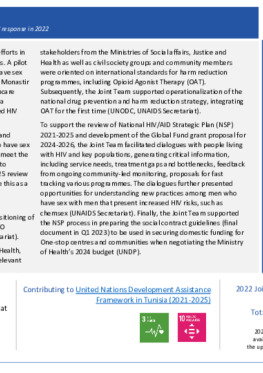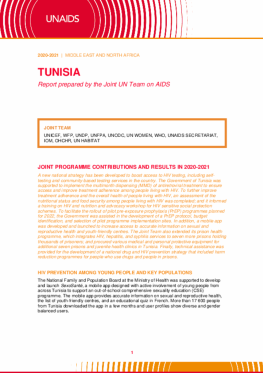|
Tunisia
Tunisia continues to scale up HIV prevention, testing, and treatment services with significant support from the Joint Programme. For instance, integrated HIV, hepatitis B and C, syphilis prevention and treatment as well as primary healthcare services were scaled up in 12 prisons following a rapid need assessment among prisoners in Tunisia. Medical equipment was also procured to further prevent transmission of infectious diseases in closed settings (UNODC). Besides, 80 gay men and other men who have sex with men accessed pre-exposure prophylaxis (PrEP) through a pilot programme implemented at the University Hospital of Monastir (WHO, UNAIDS Secretariat). This pilot will inform the launch of a community-based PrEP project in Tunis thanks to a partnership between a national nongovernmental organization and a care and treatment centre.
Decision-makers from the Ministry of Health and other relevant stakeholders from the Ministries of Social affairs, Justice and Health as well as civil society groups and community members were oriented on international standards for harm reduction programmes, including opioid agonist therapy (OAT). Subsequently, the Joint Programme supported the operationalization of the national drug prevention and harm reduction strategy, integrating OAT for the first time (UNODC, UNAIDS Secretariat).
In 2022, following a training and the development of a reference guide, 19 community health workers from the Tunisia Association for Reproductive Health increased their capacity in delivering community-led HV testing programmes. Building on this initiative, a second training reached another 15 community workers from diverse local civil society organizations in 2023 (UNFPA). In addition, 10 000 dual HIV and syphilis testing kits were procured to expand the reach of screening services among key populations, including migrants, to their dwellings and workplaces (WHO).
With support from the Joint Programme, the evaluation of the national prevention of vertical transmission of HIV programme revealed critical gaps, including shortages of trained healthcare providers and the lack of technical documents. Recommendations from the evaluation will inform programming from 2024 onwards (WHO).
A community-led study generated key information on the connection between gender-based violence and HIV, particularly regarding stigma and the legal and structural responses to people living with HIV. The study revealed that people from vulnerable populations experienced numerous challenges in accessing assistance services against violence, gender-based violence and discrimination due to inadequate legal framework; lack of awareness and poor staff training on these issues; and complex administrative procedures (UNFPA).
The Joint Programme supported efforts to strengthen the sustainability of the national HIV response through the development of the social contracting guidelines, which will be used to secure domestic funding for one-stop service delivery centres and communities; and through completing a social return-on-investment case study that underscored significant social returns on investments on community-led response (UNDP).
Community dialogues with people living with HIV and key populations, generated critical information, including on service needs, treatment gaps and bottlenecks to ensure a successful review of the National HIV/AIDS Strategic Plan 2021-2024 and the mobilization of over USD 6 million from the Global Fund for the 2024-2026 period (UNDP, UNAIDS Secretariat). A community-led survey on the availability, accessibility and acceptability of condoms and lubricants among gay men and other men who have sex with men also generated evidence that informed these key processes, all through technical and financial support from the Joint Programme (UNAIDS Secretariat).





